Wikipedia:Picture of the day/January 2013
|
Featured picture tools: |
These featured pictures, as scheduled below, appeared as the picture of the day (POTD) on the English Wikipedia's Main Page in January 2013. Individual sections for each day on this page can be linked to with the day number as the anchor name (e.g. [[Wikipedia:Picture of the day/January 2013#1]] for January 1).
You can add an automatically updating POTD template to your user page using {{Pic of the day}} (version with blurb) or {{POTD}} (version without blurb). For instructions on how to make custom POTD layouts, see Wikipedia:Picture of the day.Purge server cache
January 1

|
Dilma Rousseff is a Brazilian economist and politician who served as the 36th president of Brazil, holding the position from 2011 until her impeachment and removal from office on 31 August 2016. She was the first woman to hold the office. Previously she was Chief of Staff to the President of Brazil, serving under President Luiz Inácio Lula da Silva, from 2005 to 2010. The daughter of a Bulgarian entrepreneur, she is an economist by training and co-founder of the Democratic Labour Party. She served as Da Silva's Minister of Energy and became Chief of Staff after José Dirceu's resignation amidst scandal. She was elected the presidency in a run-off election on 31 October 2010. Photo: Agência Brasil
Recently featured:
|
January 2

|
Shasta Dam, an arch dam across the Sacramento River at the north end of the Sacramento Valley, California, during its construction in June 1942. The dam mainly serves long-term water storage and flood control in its reservoir, Shasta Lake, and also generates hydroelectric power. At 602 ft (183 m) high, it is the ninth-tallest dam in the United States and forms the largest reservoir in California. Photo: Russell Lee, FSA-OWI; Restoration: Chick Bowen
Recently featured:
|
January 3

|
The Ivan Vazov National Theatre, located in the centre of Sofia, is the national theatre of Bulgaria. It is named after the "patriarch of Bulgarian literature", Ivan Vazov. The neoclassical structure was designed by Viennese architects Hermann Helmer and Ferdinand Fellner. Since its opening on 3 January 1907, it has undergone reconstruction several times, the latest in 2006. Photo: Plamen Agov
Recently featured:
|
January 4

|
The white-lipped tree frog (Litoria infrafrenata) is the world's largest tree frog. This species is native to the rainforests of Northern Queensland, New Guinea, the Bismarck Islands and the Admiralty Islands. It can reach a length of over 13 cm (5 in), with females growing larger than males. The lower lip has a distinctive white stripe, giving this species its common name. Photo: JJ Harrison |
January 5
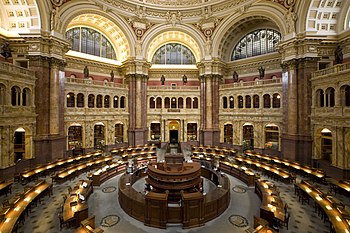
|
The main reading room of the United States Library of Congress, located in the Thomas Jefferson Building, the oldest of its three buildings. Constructed between 1890 and 1897, the Beaux-Arts style building is known for its classicizing facade and elaborately decorated interior, designed during the "American Renaissance". Photo: Carol M. Highsmith |
January 6
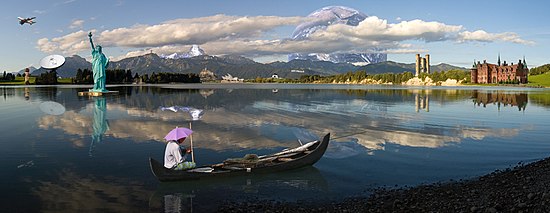
|
|
Photomontage is the process and result of making a composite photograph by cutting and joining a number of other ones. Here, 16 different photos have been digitally manipulated in Photoshop to give the impression that it is a real landscape. The term was coined by German Dadaists, but the technique, then known as combination printing, originated with the British-based Swedish artist Oscar Rejlander in the 1850s. Image: Mmxx |
January 7

|
The Frecce Tricolori is the aerobatic demonstration team of the Italian Aeronautica Militare, based at Rivolto Air Force Base, in the Friuli Venezia Giulia region, province of Udine. They were formed in 1961 as an Air Force team, replacing unofficial teams that had been sponsored by various commands by the end of the 1920s. Photo: Łukasz Golowanow
Recently featured:
|
January 8

|
Two male impalas (Aepyceros melampus) fighting during rutting (breeding) season, which begins yearly toward the end of the wet season in May and lasts typically for three weeks. During this period, males often rub their antlers on trees or shrubs, fight with each other, and herd estrus females together. Photo: Muhammad Mahdi Karim
Recently featured:
|
January 9

|
The Château de Maintenon is a château in the commune of Maintenon in the Eure-et-Loir département of France that served as the private residence of the second spouse of Louis XIV, Madame de Maintenon. Formerly a castle, it has been classified as a monument historique by the French Ministry of Culture. Photo: Eric Pouhier
Recently featured:
|
January 10

|
The Grey-tailed Tattler (Tringa brevipes) is a small shorebird native to northeast Siberia. It is strongly migratory and winters on muddy and sandy coasts from southeast Asia to Australia. It is closely related to and physically resembles the North American Wandering Tattler. Photo: JJ Harrison
Recently featured:
|
January 11

|
The Nova Scotia Duck Tolling Retriever is a medium-sized retriever dog breed that originated in southwestern Nova Scotia, Canada. It is named for its ability to lure waterfowl within gunshot range, called "tolling". It is particularly suited for retrieving in cold water climates because of its water-repellent double coat. Photo: Kallerna
Recently featured:
|
January 12
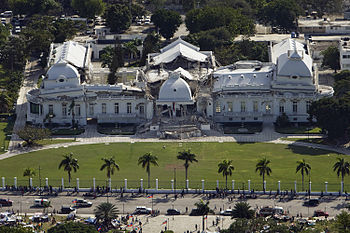
|
This photo, taken the day after the 2010 Haiti earthquake, shows the damage it caused to the National Palace of Haiti. The palace's collapsed cupola has become a symbol of the devastation caused by the quake. The Haitian government is currently in the process of demolishing the remains in preparation for reconstruction. Photo: Logan Abassi, UNDP Global
Recently featured:
|
January 13

|
The green sea turtle (Chelonia mydas) is an endangered sea turtle found in tropical and subtropical seas around the world, with two distinct populations in the Atlantic and Pacific Oceans. The common name derives from the usually green fat found beneath its carapace. Photo: Mbz1 |
January 14

|
|
A panoramic view of Blois, the capital of Loir-et-Cher department in central France, situated on the banks of the lower river Loire between Orléans and Tours. The area has been inhabited since at least the 6th century and was once the seat of a powerful countship. It is also known for being Joan of Arc's base of operations for the relief of Orléans. Photo: David Iliff |
January 15
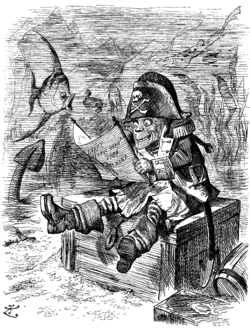
|
Davy Jones' Locker is an idiom used as a euphemism for drowning ("to be sent to Davy Jones' Locker"). This illustration from the English satirical magazine Punch shows Jones on his locker while viewing a 1789 chart of Ferrol Harbour, Spain, belonging to HMS Howe. The ship had run aground at the mouth of the harbour on 2 November 1892, allegedly after using a poorly prepared naval chart to navigate its waters. In the accompanying caption (not included here), Jones is saying, "Aha! So long as they stick to them old charts, no fear o' my locker bein' empty!!" Artist: John Tenniel
Recently featured:
|
January 16

|
Nasser Al-Attiyah, a Qatari rally driver, in a Ford Fiesta S2000 at the 2010 Rally Finland. He is the only Arab to have won the Dakar Rally, which he did in 2011. In addition to driving, Al-Attiyah is a sport shooter and won a bronze medal in the 2012 Summer Olympics in skeet. Photo: Kallerna
Recently featured:
|
January 17
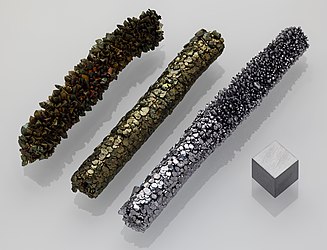
|
Three bars of pure vanadium in various states of oxidation made using the crystal bar process, and a 1 cm3 cube of it for comparison. Vanadium is a hard, silvery gray, ductile and malleable transition metal named after Vanadís, the Germanic equivalent of the Norse goddess Freyja. In nature, vanadium only exists in chemically combined form. Photo: Alchemist-hp
Recently featured:
|
January 18

|
|
Schematic diagram of a piano, one of the most popular musical instruments in the world. The diagram (see legend) shows a grand piano, one of two basic piano configurations, the other being the upright piano. Full-size grand pianos are preferred for concerts, because larger pianos with longer strings have larger, richer sound and lower inharmonicity of the strings. Image: Olek Remesz/Bechstein
Recently featured:
|
January 19
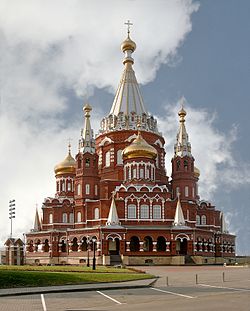
|
St. Michael's Cathedral in Izhevsk, Russia, is one of the two main Orthodox churches of Udmurtia. It is built in the Russian Revival style and its tent-like roof is 67 m (220 ft) tall. The church was originally built in 1915, but destroyed by the Soviets in 1937. It was then reconstructed in 2007. Photo: Richard Bartz/Murdockcrc
Recently featured:
|
January 20

|
A diagram of the federal government of the United States and its relationship to the 34 states and nine territories in 1862. At the top is the Constitution, the "supreme law of the land". The blue line originating from it represents allegiance and the red line shows the separation of Constitutional powers. Art: N. Mendal Shafer; Restoration: Fallschirmjäger
Recently featured:
|
January 21

|
The Tawny Frogmouth (Podargus strigoides) is a large species of frogmouth found throughout the Australian mainland, Tasmania, and southern New Guinea. Unlike the owl for which it is often mistaken, the Tawny Frogmouth is not a bird of prey. Instead, it is almost exclusively insectivorous. For defense, it relies on cryptic camouflage, standing still to appear part of a branch. Photo: Benjamint444 |
January 22

|
The comma butterfly (Polygonia c-album) is found in temperate areas of Europe and Asia and is named after a white 'C' shape on the underside of the wings resembling a comma. The wings have a distinctive ragged edge, apparently a cryptic form as the butterfly resembles a fallen leaf. Photo: Quartl |
January 23
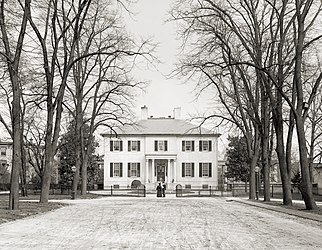
|
A 1905 photograph of the Executive Mansion, the official residence of the Governor of Virginia. Designed by Alexander Parris and completed in 1813, it is the oldest occupied governor's mansion in the United States. It is both a Virginia and a National Historic Landmark, and has had a number of successive renovations and expansions during the 20th century. Photo: Detroit Publishing Co.; Restoration: Jbarta
Recently featured:
|
January 24

|
A sketch of a longnose sawshark (Pristiophorus cirratus), a species of sawshark found in the eastern Indian Ocean around southern Australia on the continental shelf at depths of between 40 and 310 m (130 and 1,020 ft). It is a medium-sized shark with a saw-like flattened snout which measures up to thirty percent of its body size. Artist: William Buelow Gould
Recently featured:
|
January 25

|
|
The Thames Barrier, the world's second-largest movable flood barrier, as seen from Silvertown on the north bank of the River Thames during normal operation, looking across to New Charlton. The barrier is located downstream of central London and its purpose is to prevent London from being flooded by exceptionally high tides and storm surges moving up from the sea. It needs to be raised (closed) only during high tide; at ebb tide it can be lowered to release the water that backs up behind it. Photo: David Iliff
Recently featured:
|
January 26
|
A panoramic view of the Paris business district of La Défense, which includes the cities of Puteaux, Courbevoie and Nanterre, as seen from the Tour Défense 2000. The area holds many of the Paris urban area's tallest high-rises. With its 77.5 acres (314,000 m2), its 72 glass-and-steel slick buildings including 14 high-rises above 150 m (490 ft), its 180,000 daily workers, and 3.5 million m2 (37.7 million sq ft) of office space, La Défense is Europe's largest purpose-built business district. Photo: Dimitri Destugues
Recently featured:
|
January 27

|
The giraffe (Giraffa camelopardalis, ssp. tippelskirchi shown here) is the tallest living terrestrial animal and the largest ruminant. There are nine subspecies, which are distinguished by their coat patterns. Fully grown giraffes stand 5–6 m (16–20 ft) tall, with males taller than and weighing nearly twice as much as females. The giraffe's scattered range extends from Chad in the north to South Africa in the south, and from Niger in the west to Somalia in the east. Giraffes usually inhabit savannas, grasslands, and open woodlands. Their primary food source is acacia leaves, which they can browse at heights which most other herbivores cannot reach. Photo: Muhammad Mahdi Karim
Recently featured:
|
January 28

|
Thomas Cranmer (1489–1556, depicted in 1545) was a leader of the English Reformation and Archbishop of Canterbury during the reigns of three monarchs. Ascending to power during the reign of Henry VIII, under Edward VI he was able to promote a series of reforms in the Church of England. He was executed for treason under Mary I. Painting: Gerlach Flicke
Recently featured:
|
January 29

|
|
Three types of nail clippers, used to cut finger- and toenails as part of grooming. The left is in the plier style, while the centre and right cutters are in the compound lever style. Like most clippers on the market, these three are made of stainless steel. Photograph: Evan-Amos
Recently featured:
|
January 30

|
The White-faced Heron (Egretta novaehollandiae, shown in non-breeding plumage) is a relatively small heron that is common throughout most of Australasia. First described by John Latham in 1790, adults range in size from 60 to 70 centimetres (24 to 28 in) in length. Photograph: JJ Harrison
Recently featured:
|
January 31

|
An Antonov An-124 belonging to Polet Airlines on final approach to Sheremetyevo International Airport in Moscow, Russia. The An-124 was designed for strategic lift capability and remains among the largest operating cargo aircraft. Photograph: Sergey Kustov
Recently featured:
|
Picture of the day archives and future dates

